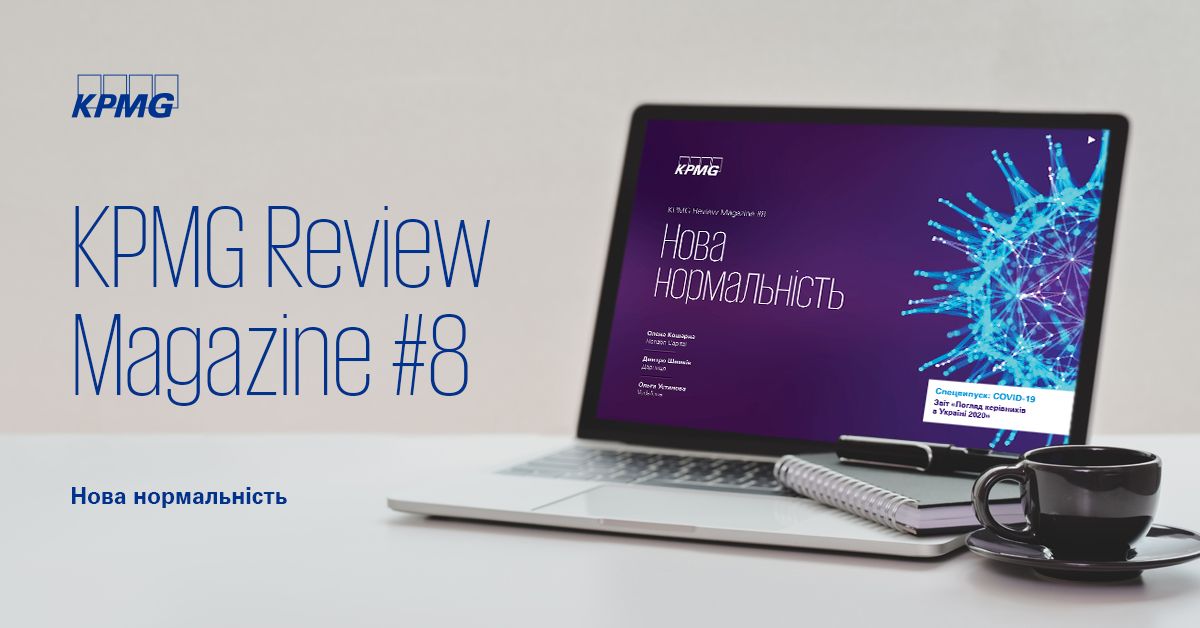Lenna Koszarny is a Founding Partner and CEO of Horizon Capital, a leading private equity firm in Ukraine.
She spoke with Peter Latos, KPMG’s Head of Advisory in Ukraine, in a wide-ranging discussion about the secrets behind Horizon’s rapid rise to the top, its response to recent tumultuous events, the impact of new technology and Horizon’s forward strategy to address the quickly evolving changes to business and society.
Download the eighth issue of KPMG Review Magazine "A new normal" (PDF 4 MB).
In the space of little more than five years, Horizon Capital has grown into the largest Private Equity firm in Ukraine; with USD850 million under management, over USD750 million invested in 150 companies in Ukraine, Moldova and further afield, and over USD2 billion of capital attracted to the region. But Koszarny has set her sights on a different scale of achievement. She’s not content with being in the top flight of firms by margin in Emerging Europe: “We want to be flight for our investors, and stay there,” she says.
There isn’t one magic ingredient to Horizon’s success, Koszarny stresses, but there are certainly some musthaves — key among which is having the right people and a meritocratic culture. While that means attracting top talent from the region as part of the Horizon team; with MBAs from Harvard, Wharton and other leading business schools, as well as blue-chip consulting or operational credentials, Koszarny is just as passionate about ensuring that the founders of the businesses that Horizon invests in are driven, single-minded visionary entrepreneurs.
Whilst other countries have business incubators and accelerators with government support for new businesses, Ukrainian entrepreneurs are largely on their own and that makes them a special breed, Koszarny feels. “I have enormous respect for Vladyslav and Iryna Chechotkin,” she says, “they started Rozetka inan apartment and they are the number one e-commerce champion in the country.” She also draws attention to Jooble founders Roman Prokofiev and Yevgeniy Sobakarev: “they built the number two job aggregator in the world. That’s amazing.” To this pantheon of young entrepreneurs, Koszarny adds Aleksandr Konotopskiy of Ajax Systems, the home security systems manufacturer. She also note the accomplishments of Vladimir Mnogoletniy of Genesis, the venture builder which launched Jiji, the leading online marketplace in five African countries, and also BetterMe; one of the fastest-growing health and fitness apps in the world, led by Victoria Repa. Koszarny describes these Ukrainian entrepreneurs who chose to build their businesses even under difficult circumstances as being like “a catcus in the desert: super strongand resilient which makes them perfect to take over the region and the world.” Highlighting their resilience, Koszarny even admits that she admires these Ukrainian entrepreneurs “even more than Elon Musk or Jeff Bezos.”
Despite the COVID-19 pandemic, Koszarny remains optimistic about Ukraine’s economic prospects. The crisis hit at a time when the country was very well placed to withstand it, she says, given the belt-tightening undertaken since 2014 / 2015. “We are sitting on the highest foreign currency reserves in seven years, we had an extremely low net debt to GDP [ratio] of 52 percent. We had just over 3 percent growth last year.” So, while the second quarter of 2020 saw GDP decline by 11 percent, Koszarny compares this with the Euro zone and the USA which have seen drops of 12.1 and 32.9 percent respectively. “Now we’ve seen a 4 percent month-on-month increase in June and July. Relatively speaking, Ukraine is in decent shape.” But she also warns that although “we’ve got almost $30 billion in foreign currency reserves… it’s very important that monetary and fiscal stability is there, and it is extremely important to preserve it.” And while some of the countries neighbouring Ukraine can spend up to 15 percent of their GDP to stimulate their economy, “we’re not in that place.” Koszarny warns.
“There’s no silver bullet,” she stresses, “[but] I’m analysing the Ukrainian government, I would be saying to leave no stone unturned, to ignite structural reforms and to do the heavy lifting that brings investors’ confidence in [Ukraine’s] rule of law, trust, transparency and political will”. As Chair of the American Chamber of Commerce in Ukraine, Koszarny says that the mantra from the Chamber and its members is very clear: “Rule of law, rule of law, rule of law.” She says there is an essential need to ensure a fair and transparent court system, followed by cooperating with business based on “trust, transparency and political will.” This, Koszarny says, is what will move the country forward. Investors need to have confidence. And Ukraine needs investors.
This is a new world, everyone must be digitally savvy, understand how to communicate in various forms, whether it’s a conference through a Zoom call, a message in WhatsApp or Telegram. Keeping up communication is key.
Horizon has continued to invest throughout the pandemic. The private equity cycle is 3 to 5 years, followed by divestment. While for many there was a slowdown as people adjusted to a new reality, Horizon Capital continued to pursue deals irrespective of the external situation. Perhaps Horizon is an anomaly, Koszarny suggests, but “for us, there was no slowdown, we continued to invest.” She also has plans, to announce a further deal soon*. Horizon’s most recent fundraising round drew in USD200 million and, according to Koszarny, “we’ve been putting it to work since December 2018.”
The focus is on backing “Export Champions and Domestic Champions” she adds. Even in the current downturn, Horizon hasn’t ventured into special situations or distressed assets. “ In terms of the thesis supported by our investors […] we stick to what we’re good at: mid-cap growth equity with a strong tech focus, 70 percent export champions, 30 percent domestic.” This goes beyond IT, including investments in light manufacturing, food processing and other attractive sectors.
Koszarny sees great opportunity in the tech sector. Indeed, around 50 percent of the assets in Horizon’s most recent fund are in this sector. She predicts that we may see over 20 percent growth in tech this year and notes the objective of the Ministry of Digital Transformation to drive the sector to over $15 billion. The recent financing rounds for Gitlab and Grammarly; two Ukrainian tech businesses that have become household names worldwide, were a great success and perfectly demonstrate the opportunities Koszarny mentioned. “E-commerce is extremely hot, not only general e-commerce […] but also niche e-commerce”, she points out. Offering an example, Koszarny adds, “we just invested in a company called MAKEUP that is specialised e-commerce in beauty products.” The business, which operates across 14 countries, was started by Ukrainian entrepreneurs led by Serhii Volobuiev. “They’re not satisfied with only conquering Ukraine, they want to go regional, global and put their footprint far and wide […] We are very honoured to be the largest financial investor in the capital structure for this company”.
But for Horizon, Koszarny says, it’s not just an issue of identifying an investment target. Great investment opportunities can secure finance anywhere, she believes. Horizon’s USP is the way it contributes to value-add projects and works alongside the business founders to drive growth and capitalise on opportunities. For that, Koszarny explains, you need to build relationships: “You have to be able to keep pace and you have to be respected by them […] It’s not just: ‘What’s your business model?’ It’s first and foremost about the founder behind the business.” Horizon’s Senior Partner Denis Tafintsev spent 3 to 4 years getting to know the Chechotkins before striking the deal to invest in Rozetka, and Koszarny feels that this kind of working relationship is one of the key ingredients of Horizon’s success . “Without those visionary entrepreneurs and founders who’ve created these companies, we would not be where we are. And we certainly would not be looking to provide them with growth equity.”
Beyond this, Koszarny feels this personal touch is necessary on both ends for Horizon and its partners to invest the significant time and effort needed to grow the business together. Asked how she feels about the move to remote working during the pandemic, Koszarny is upbeat. “In the last year we spent a great deal of time and money making sure that all of our systems and processes were modern. We implemented SAP, we transferred everything to the cloud. We were ready.”
She doesn’t see a full return to the office and predicts that, for many businesses, whole functions or departments may never return. In many cases, not just the larger businesses but even individuals themselves will be more productive, Koszarny thinks: “Without having to commute and with the opportunity to focus… remote working is here to stay.” Some of Horizon’s investors have already told their staff that they will not be coming back to the office until spring 2021 at the earliest. “This is the new world, everyone must be digitally savvy, needs to understand how to communicate in different forms, whether it’s a conference through a Zoom call, a message in WhatsApp or Telegram […] Keeping up communication is key”. Horizon set up a regular chat with all of its CEOs, hosted webinars, asked McKinsey Partners, members of the Ukrainian Cabinet of Ministers and other business leaders to share information. Any material of value to Horizon’s business partners can be “instantly uploaded to 20-plus top CEOs throughout the country.”
Internally, Horizon has focused on ensuring that all of their team stays in the loop wherever they are; with town hall meetings, weekly coordination calls, partner meetings and investment committee meetings. This way, Koszarny says, “we have been able to stay in touch and communicate, to move projects forward, to keep our finger on the pulse [to know] what’s going on around the companies and what’s going on with our employees.” Based in Kyiv with her family, the choice to stay in Ukraine throughout the pandemic was very important for Koszarny, particularly in this time of crisis. She recognises that, as a leader, she has an example to set. “Everyone has their answer for what [kind of] leader they were during those past months [of the pandemic] and the kind they will be moving forwards [….] Did they show their leadership in terms of wearing masks, insisting on screening and social distancing, and doing everything possible to show their employees that they were walking the walk, not just talking the talk, and that they cared about them?”
However, Koszarny warns that there are some things you just can’t do remotely: “I can’t imagine being a CEO of a private property fund being stuck somewhere like London, Connecticut, Moscow or Warsaw and trying to invest in Ukraine. It’s impossible […] it’s the people factor. It’s the fact that you can’t go and kick the tyres.” She wonders how it could be possible to consider investing hundreds of millions of dollars without flying in and meeting people. “[Investors] may be able to look in a virtual data room but can they go and sit down to have a coffee with the CEO they want to back in the future and get comfort about the business they’re buying?” The benefits of operating locally are clear, Koszarny feels.
Lenna Koszarny sees continued growth for Horizon in the future: “We are extremely decisive, that is very important […] Being decisive and trusting your intuition.” It’s an art and a science in investing, and she affirms that you’ve got to have both in order to be successful. Horizon’s mediumterm goal is to manage USD1 billion. “We’re looking at this next fundraise, we’re already talking about it and what it will include. People are are excited that because of the founders’ efforts and our efforts alongside them, the companies we currently invest in have grown the top line by over 40 percent across the whole portfolio over the last three years.” Horizon’s deal professionals are there throughout the business cycle, from sourcing to adding value and exiting, and this creates a huge amount of adrenaline, momentum and inspiration in the team, Koszarny says. “We make sure ambitious goals are always front and centre.”
Lenna Koszarny
Founding Partner and CEO of Horizon Capital
*Just days after we spoke, Horizon announced a new investment into Liki24; a marketplace for medicines and delivery services, aggregating offers from thousands of pharmacies that increases the selection and price transparency for consumers and provides fast reliable delivery or self-pickup options. The Company’s vision is to make medicines affordable and available for every client, regardless of his or her location and income level. Horizon Capital’s Emerging Europe Growth Fund (EEGF) III invested in the latest equity round to support the Company’s ambitious European expansion plans; with Poland being the first international market where Liki24 has recently launched operations.







